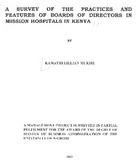| dc.description.abstract | In today's turbulent environment the survival of organizations is dependent on the credibility and
professionalism of its management. This means that, organizations that survive must be governed
by people who know what the organizations are about, and have a clear vision and understanding
of where they want to be in the years to come. This makes the issue of governance to be of critical
importance in any type of organization. The concept of corporate governance is concerned with
the way organizations are run. It primarily aims at influencing the means through which top
management reach laid down company objectives. These means must be appropriate and
rewarding to both the company and the immediate community or stakeholders
Many modern organisations have come to be characterized by a clear separation of ownership
from control. Today, shareholders especially in large organizations have minimal influence over
corporate affairs other than voting in the AGM. The boards of directors, which they elect, have
come to fill this gap thereby being the link between the owners and management. Thus an
organisation's chances of success depend heavily on both the quality of the board and senior
management. Such boards, it is expected will practice the tenets of good corporate governance.
This study seeks to carry out a survey of the practices and features of the board of directors in
mission hospitals in Kenya.
The research design used in this study is the cross-sectional survey. It identifies the research
population as those Christian mission hospitals affiliated to either CHAK or KCS in Kenya
numbering 52 in total. It draws out a research sample by using stratified random sampling
procedures to select the eventual number of 25 mission hospitals from two strata. The primary
data was collected using a questionnaire administered by an interviewer. Secondary data was also
utilised. Data was analysed using descriptive and inferential statistical methods.
The findings show that other bodies other than boards of directors have a profound influence on
the appointment of board members and therefore direction of decision-making. The boards also
lack a clear succession policy hence eroding the ability to attract good management. Women are
marginalised as much as transparency is stifled. All these factors hinder good performance of
board of directors in these institutions.
Even though the study had limitations such as time and financial resources among others, it
proceeded to the end and recommends that empirical studies be carried out as well as formulation
of theoretical models for corporate governance as an element of mission hospitals' development
in Kenya. Continuous research is necessary to chart out a proper path for corporate governance in
hospitals. Apt management practises in mission hospitals need to be enhanced. | en |

